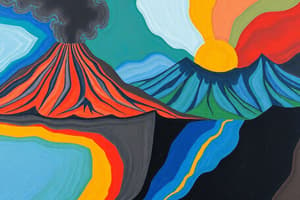Podcast
Questions and Answers
What primarily causes earthquakes and volcanic activities?
What primarily causes earthquakes and volcanic activities?
- Weather changes
- Movement of tectonic plates (correct)
- Human activities
- Erosion of land
What are volcanoes primarily formed from?
What are volcanoes primarily formed from?
- Solid rock
- Compressed air
- Magma escaping through an opening (correct)
- Sedimentary layers
Which type of volcano is characterized by a wide base and emits primarily lava?
Which type of volcano is characterized by a wide base and emits primarily lava?
- Cinder Cone Volcano
- Fissure Volcano
- Shield Volcano (correct)
- Composite Volcano
Which process involves a denser oceanic plate sinking beneath a less dense plate, forming magma?
Which process involves a denser oceanic plate sinking beneath a less dense plate, forming magma?
What is the 'Ring of Fire' known for?
What is the 'Ring of Fire' known for?
Cinder cone volcanoes are primarily formed from what type of volcanic material?
Cinder cone volcanoes are primarily formed from what type of volcanic material?
Which statement correctly describes the formation of volcanic islands?
Which statement correctly describes the formation of volcanic islands?
What characterizes a composite volcano?
What characterizes a composite volcano?
Which type of volcano is characterized by its cone shape and built from many layers of lava, pumice, ash, and tephra?
Which type of volcano is characterized by its cone shape and built from many layers of lava, pumice, ash, and tephra?
What defines an active volcano?
What defines an active volcano?
How many active volcanoes are listed in the Philippines according to Delos Reyes et al. (2018)?
How many active volcanoes are listed in the Philippines according to Delos Reyes et al. (2018)?
Which of the following statements is true regarding dormant volcanoes?
Which of the following statements is true regarding dormant volcanoes?
What is one characteristic of an extinct volcano?
What is one characteristic of an extinct volcano?
The Pacific Ring of Fire is primarily associated with what geological features?
The Pacific Ring of Fire is primarily associated with what geological features?
Which of the following volcanoes is located in Mindanao?
Which of the following volcanoes is located in Mindanao?
What type of lava flow is characteristic of composite volcanoes?
What type of lava flow is characteristic of composite volcanoes?
Flashcards are hidden until you start studying
Study Notes
Plate Tectonic Theory
- Molten rock movement in the mantle causes earthquakes and volcanic activity as it escapes through crust cracks along tectonic plate boundaries.
Definition of Volcano
- A volcano is an opening in a planet or moon's crust that allows molten rock, gases, ash, and rocks to erupt, forming hills or mountains.
Formation of Volcanoes
- Volcanoes form when magma is pushed up to the Earth's surface and flows as lava.
- Common locations for volcano formation include plate boundaries and hotspots.
- Active volcanoes are often found along the Pacific Ring of Fire, a zone surrounding the Pacific Ocean.
Process of Eruption
- Eruptions occur when hot molten rock, ash, and gases escape from the Earth's surface, cooling to form the volcano's shape.
- Eruptions can include flowing lava, ash dispersions, and gas emissions.
- The collision of tectonic plates can create volcanic islands, such as Montserrat, via the subduction of denser oceanic plates.
Types of Volcanoes Based on Structure
- Cinder Cone Volcano: Simplest type, built from lava particles; steep slope, emits ash during eruptions.
- Shield Volcano: Wide base resembling a shield, formed from low-viscosity lava flows.
- Composite Volcano (Stratovolcano): Intermediate slope, composed of layers of lava, ash, and tephra; emits both ash and lava.
Types of Volcanoes Based on Activity
- Active Volcano: Currently erupting or expected to erupt soon.
- Dormant Volcano: Not currently erupting but has a history of eruptions and may erupt again.
- Extinct Volcano: Considered dead, not expected to erupt in the future.
Volcanoes in the Philippines
- The Philippines has 24 active volcanoes identified by Delos Reyes et al. (2018) including Babuyan Claro, Banahaw, and Bulusan, located across various provinces.
Inactive Volcanoes in the Philippines
- Inactive volcanoes include Atimbia (Laguna), Bangcay (Nueva Ecija), and Balungao (Pangasinan).
Pacific Ring of Fire
- The Philippines lies within the Pacific Ring of Fire, characterized by tectonic activity involving multiple plates (Pacific, Philippine, Eurasian, Juan de Fuca, Cocos, and Nazca).
- Volcanoes around the world are not randomly distributed, primarily aligning along tectonic plate boundaries.
Studying That Suits You
Use AI to generate personalized quizzes and flashcards to suit your learning preferences.



